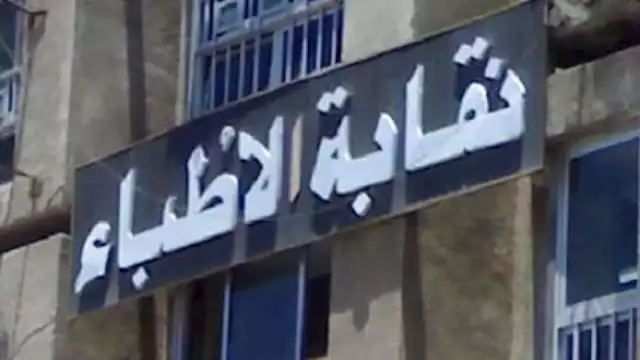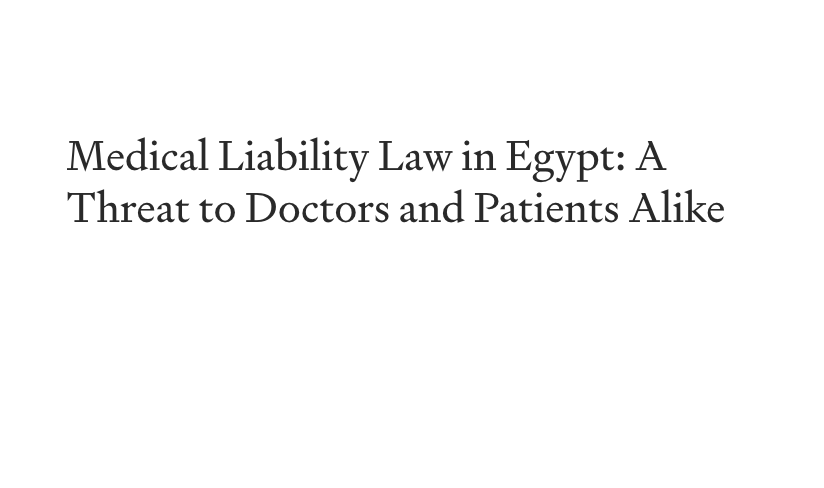Medical Liability Law in Egypt: A Threat to Doctors and Patients Alike
Table of Content
The Egyptian healthcare system is on the verge of a crisis. A controversial draft law regulating medical liability has sparked outrage among healthcare professionals across the country.
The law, recently approved by the Health Committee of the Egyptian Senate, introduces provisions that medical professionals argue will exacerbate existing challenges in the healthcare sector, promote defensive medicine, and push doctors to leave Egypt in search of safer working environments.
Here’s why this legislation is a ticking time bomb for the country’s healthcare system.
What Is the Controversy About?
The General Syndicate of Doctors has vehemently rejected the draft law, particularly the clauses that allow for imprisonment in professional liability cases.
Despite vocal opposition from medical professionals and heated discussions in the Senate, the Health Committee approved the bill without addressing the Syndicate’s key demands, including:
No Imprisonment for Professional Cases
Doctors argue that medical errors, when committed within the scope of their practice and while adhering to professional standards, should result in civil liability (compensation) rather than criminal penalties like imprisonment.
Criminal Accountability Only for Grave Violations:
Criminal charges should apply only when doctors act outside their specialization, violate state laws, or perform prohibited procedures.
No Preventive Detention
Healthcare providers should not face preventive detention for allegations arising during or because of their professional duties, as these cases lack the justification for such measures.
A Fair and Independent Medical Committee
A higher committee for medical liability should act as a technical expert for investigations and lawsuits, handling all complaints and ensuring fairness.
Comprehensive Compensation Fund
A dedicated compensation fund should cover full reparations for medical errors, rather than placing a financial burden on doctors.

The Threat to Egypt’s Healthcare System
Doctors on the Brink of Exodus
Egyptian doctors are already struggling under challenging conditions, including low wages, long hours, and increasing aggression from patients and their families. Without legal protections, this new law will make the medical profession even more precarious.
Cases of doctors being assaulted by angry patients or their families are not uncommon, and the government’s lack of intervention has left many physicians feeling vulnerable.
The prospect of imprisonment for unintentional errors will likely drive even more doctors to migrate to countries that offer better working conditions and legal safeguards. This brain drain will leave Egypt’s healthcare system understaffed and struggling to meet the needs of its population.
Rise of Defensive Medicine
Defensive medicine—where doctors order unnecessary tests, procedures, or referrals to protect themselves from legal action—is a significant concern.
While it might seem like a safeguard, defensive medicine often harms patients by:
- Delaying Diagnoses: Over-testing can lead to delays in identifying the real issue.
- Increasing Costs: Unnecessary procedures inflate healthcare expenses, putting additional financial strain on patients.
- Risking Patient Safety: Extra tests and invasive procedures can expose patients to undue risks and complications.
For a country like Egypt, where many already struggle to afford healthcare, the rise of defensive medicine could make basic medical services inaccessible to a large segment of the population.
Consequences for Patients
The ripple effects of this legislation will not just harm doctors; patients will bear the brunt of the fallout. Here’s how:
- Limited Access to Healthcare: With more doctors leaving the country, patients will face longer wait times and reduced access to specialized care.
- Higher Healthcare Costs: Defensive medicine practices will drive up the cost of diagnostics and treatments, putting them out of reach for many Egyptians.
- Reduced Trust in the System: Patients may lose trust in doctors who prioritize legal protection over patient care, creating a toxic environment in hospitals and clinics.
- Worsening Patient-Doctor Relationships: With doctors under constant legal threat, the quality of doctor-patient communication and mutual trust is likely to deteriorate further.
A Call for Sensible Legislation
Egypt’s healthcare system needs reform, but this law is not the solution. Protecting patients and ensuring accountability for medical errors are crucial goals, but they must be balanced with safeguarding doctors from unjust penalties and harassment.
Implementing fair and clear medical liability laws, as practiced in many countries, could help achieve this balance.
The Egyptian government must address the concerns of its healthcare professionals and rethink this legislation before it’s too late. Failure to act will not only jeopardize the livelihoods of doctors but also endanger the health and well-being of millions of Egyptians who rely on a functioning healthcare system.
Resources
- The Doctor's syndicate Reply












